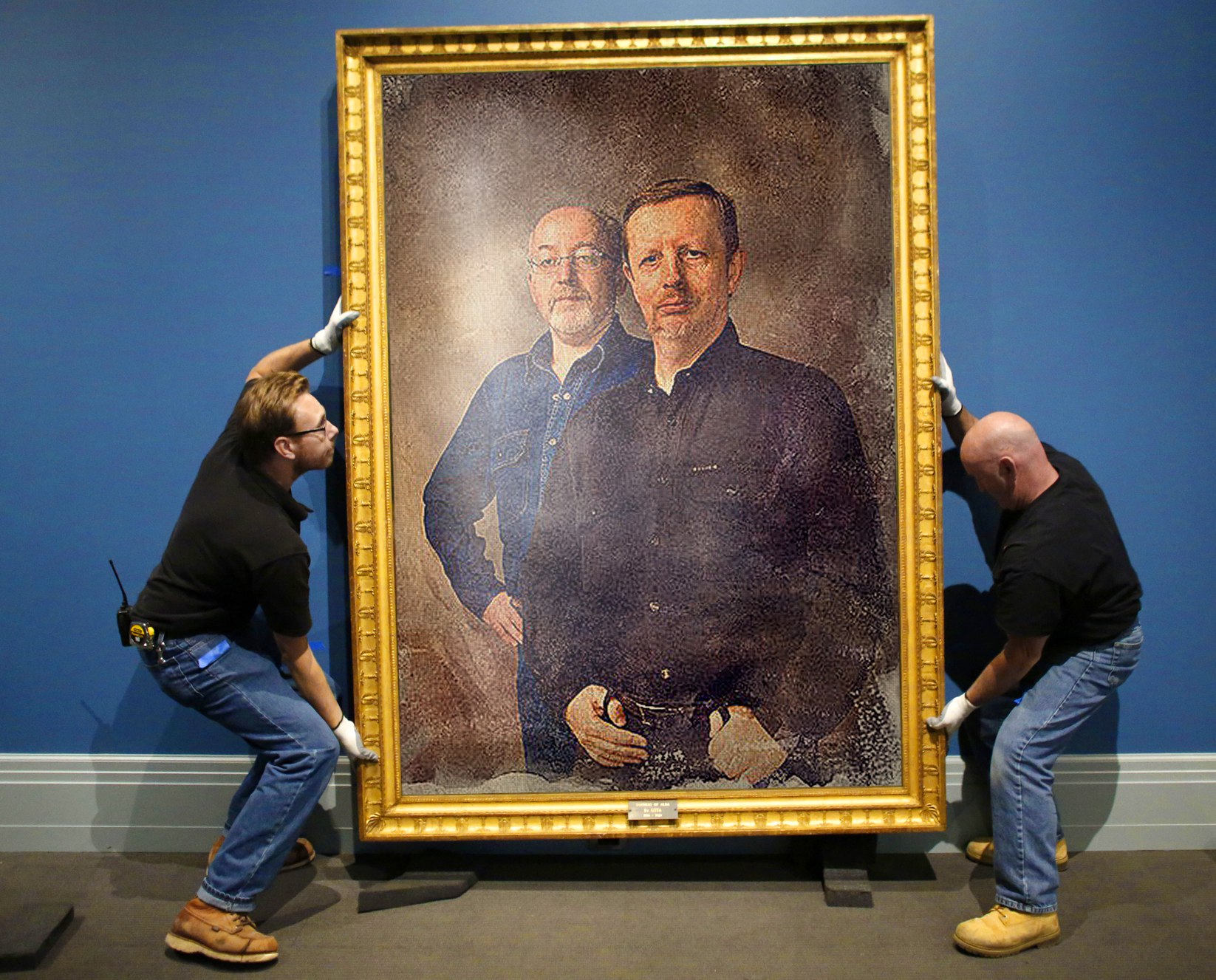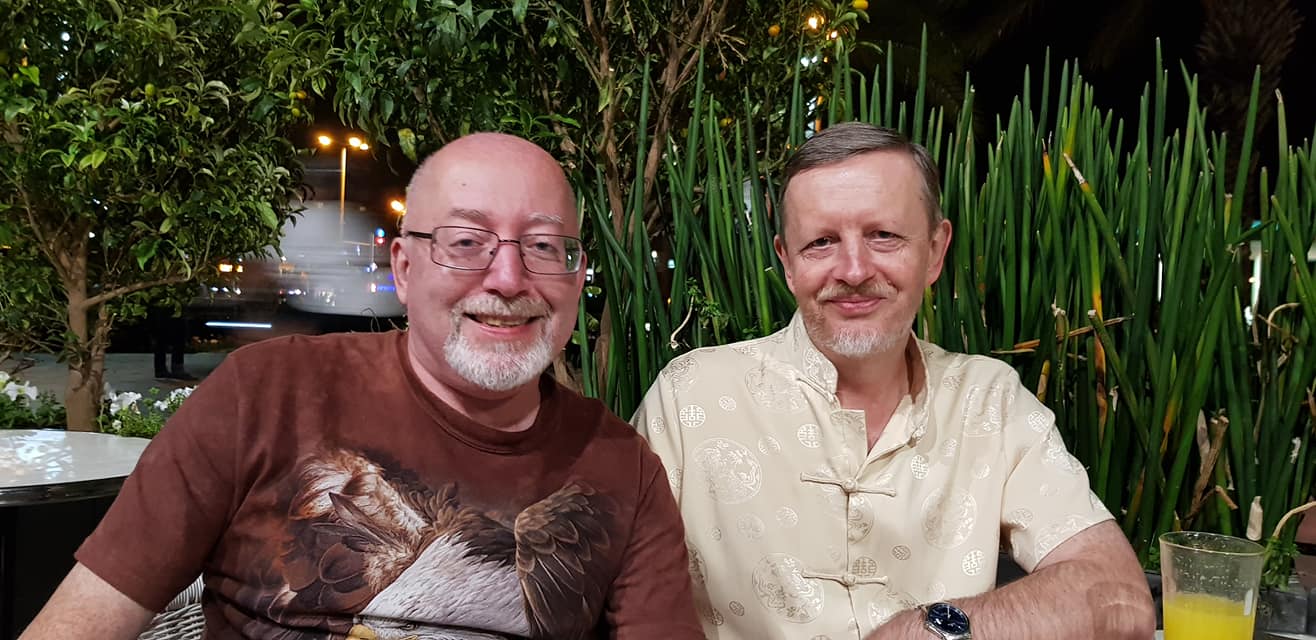All Ukrainian science fiction and fantasy fans held their breath, waiting to hear who would be named as Europe’s best author at Eurocon, the annual science fiction convention. A moment later, they chanted in enthusiasm: “Oldie! Oldie!”
It seems that the excitement of last year’s triumph of Marina and Sergey Dyachenko is still in the air as Sir Henry Lion Oldie, which is a joint penname of Dmitry Gromov and Oleg Ladyzhensky, has again proved to the world that Ukrainian soil still has the legendary fertility to produce writers.
However, this victory was not unexpected. Oldie had already collected a number of prizes at various competitions and topped quite a few book reviews and hit parades.
Not all readers can read as fast as Oldie writes. By now more than 100 books by this duo are available to readers, including translations and republications, with the total number of copies topping one million! And yet this gentleman from Kharkov does not even think about rest in gone his oars…
Meridian: What is it like to be named Europe’s best science fiction writer?
Oldie: Of course, recognition is a pleasant thing. But we can only bask in this pleasant feeling of glory for one or two days before our creative work calls us back. The new novel Oicumene, the story “Parasite” (Zakhrebetnyk), preparation of the “Modern Ukrainian Fantasists” entry for the Stellar Bridge international science fiction convention and encyclopedia—such is our schedule. It leaves little time for us to recall that we are the best science fiction writers in Europe.
Generally speaking, we have won many international prizes, including such exotic ones as an honorary medal of the Shao-Lin monastery (China), the Moshe Dayan prize (Israel), and the Sword of Northern Lands prize (Germany, a people’s choice award). But prizes do not determine a writer’s merit. His or her books determine that.
Meridian: This is the second time Ukrainian authors have won such an honorary title. By and large, we see science fiction flourishing in Ukraine. It has become the mainstream of modern Ukrainian literature. How do you explain this phenomenon? And who, in your opinion, could repeat the feat of Dyachenkos-Oldie in the near future?
Oldie: Science fiction and fantasy is a literature of free people able to take an unusual approach to our reality. Some authors, however, feel ashamed when called science fiction writers. It seems to them that this title automatically places them into a lower category, making them “low genre” workers.
In our opinion, science fiction or fantasy is not a genre. It is a literary movement, just like realism or romanticism. Fantasists often use post-modern approaches in their works, but such approaches are just part of their tools. Modern science fiction and fantasy poses the most difficult philosophical, moral, ethical, psychological, and social questions without mincing matters. This prompts readers to make a difficult moral choice together with the book’s hero, creating a strong sense of empathy between reader and character. We believe that a good book must touch the reader’s feelings. The best modern science fiction and fantasy books give readers food for thought as well as new feelings and emotions.
For this reason, science fiction and fantasy is confidently gaining new heights despite the ongoing opposition of aesthetes. We believe that we will soon be applauding, for example, Andrey Valentinov, a wonderful and elegant writer who is also our friend and colleague.
Meridian: Science fiction and fantasy are cosmopolitan genres. Is there any Ukrainian background in your books?
Oldie: Yes, of course. Take for example Pentacle, a series of thirty short stories based on Ukrainian mysticism. This work is an attempt to take a look at the mystic, chimerical Ukraine and 20th century Ukraine with its cities, towns, and farmsteads. Thanks to our writers and cinematographers, we still perceive Ukraine as a big village. So the traditional mystic Ukraine remains the same as it used to be in times of Gogol and Kvitka-Osnovyanenko. But that is not true! Ukraine is now a country of cities, even mega-cities. A new national Ukrainian character has been born. So modern mysticism is not the same any more, although it is based on old traditions. The Border presents an organic blend of demonology and chimeras, Cossack-miracle workers and beekeepers engaging in witchcraft, with all the characters acting in the context of cabalistic cosmogony. On top of that, the story takes place in the times of Gogol’s Viy. “Peter Slyadek’s Songs” is a cycle of long short stories from this series. The action takes place in 17th century Ukraine and its environs. The same is true for the novel Stepchildren of the Eighth Commandment, in which werewolves howl, millers practice sorcery, dead men rise from their graves, and the devil drives a tarantass…
On the other hand, the book We Are to Live Here is about an alternative Kharkiv from a near future where reality is mutating into myth…
Meridian: It is a fact that not all your fans know how Sir Henry Lion Oldie has come into existence. Dmitry Gromov is an chemist-engineer, and Oleg Ladyzhensky is a theatre director by occupation. It is clear that destiny has brought you together. But how did it happen?
Oldie: We first met at a literary studio called Pioneer Palace. Then, we took karate lessons in school. Oleg was a senior instructor at the time when Dmitry started to attend the lessons. A little later, Dmitry Gromov brought a fantasy play script to the Pelican amateur theater managed by Oleg Ladyzhensky. Although it has never been put on the stage, Dmitry was admitted to the theater as an author. As it turned out later, Oleg wrote poems and dramatic works and Dmitry wrote fantastic short stories. They started to exchange their texts and comments, held hot debates, and later realized that their debates actually lead to new texts, if not the truth. That fact brought about the idea of joint work. Oldie’s birthday is November 13, 1990 (that was Friday, I guess), the day we finished our first short story “The Cinema until Coffin and…” It was about vampires who captured a film studio in Hollywood and started making movies. And they loved it. We loved it, too. That is why we keep on working together.
When we had a considerable amount of serious publications to our credit, we felt it was time to pick an easily remembered penname. King would be a good penname — short and imposing. Strugatskys is also a name that’s easy to remember, because it stands for two brothers. The same is true about the Dyachenkos couple, the father and son Abramovs… But we are neither brothers nor a married couple or father and son. So we decided to make up and adopt a short penname. We derived an anagram from our names and came up with Oldie. But the publisher exclaimed in indignation, “Where are the initials?” Initials for him were like a tie to a suit. A writer’s name without initials, he reasoned, sounded like a dog’s name. So we took the first letters of our surnames, “H” (there are some differences in pronouncing “G” and “H” in English and Russian, so Gromov used “H”, but not “G”) and “L” and came up with H and L Oldie. But the publisher kept pushing us; urging to invent normal first, second, and last names. So we proposed Henry Lion as the first and second names. The literary hoax gained momentum. Rumors were rife: Who was the guy? Where was he from? If a foreigner, why, then, did he cite Gumiliov? With time, local publishers and readers started to use Oldie in various grammatical declinations.
Meridian: The following question is, probably, not new for you at all, but how do you write together?
Oldie: First, we conceive an idea. Not two of us at the same time, of course. When the idea translates into words, the one who hit upon it comes to his co-author with a bottle of wine (two bottles of beer, gin-tonic, coca-cola, mineral water — but never vodka or cognac!) and shares it. We set off into a long talk. The idea develops, alternative variants drop off, something changes, and finally the plot shapes up. We debate a lot, but we always come to a compromise. Both of us generate ideas and assume the role of skeptic on an alternate basis.
Such a conversation may last from a week (quite seldom) and up to six months (a more frequent case). Later on, when the fantastic, philosophical, and moral concepts shape up, the plot becomes clear, and the main and secondary characters develop, we decide who is to write what. “I would like to write this part and describe this character!” “Then, I take this part and this character!” We do everything on a consensus. When developing a character, some individual traits of the author’s language and thinking unavoidably transfer to the character. And since we have different personalities, the characters we create are also different, which, I think, is good.
When we finish our parts, we exchange them (we live in the same part of the building, sharing the same entrance, and our computers are interconnected into a LAN), read one another’s texts, correct style, iron out mistakes, put everything together, take other pieces to write, and continue working. This cycle is repeated over and over again until we finish the novel. Then we read it over a few times, debugging it, and when everything is done, we take the work to the publisher.
Meridian: You can create any world you want in your books. But it is interesting to know the world you live in. What is your homeland, so to speak?
Oldie: This might sound out of place, but we believe it is impossible for one to create one’s own absolutely original world. There is no kangaroo in any European myth, and the centaur is just a cross of a human and a horse. Some Planet U, New Mediterranean, three-legged and five-armed aborigines, alternative geography or ethnography are, in essence, the same reality as we know, only distorted or recreated using fragments of this reality. We write about “here and now,” about people like us. We just change the scenes, music, make-up, and lighting. But the actors are here — you and I. And the stage is here, too. Creativity does not mean a dream of a “deserter.” It is just a special angle on the world.
There have been scores of perfect worlds invented. The City of the Sun, the paradise of Communism, the garden of Eden… But normally, life there ended in expulsion, big blood or annihilation of dissidents. We do not need a perfect world. Let us just make our life beautiful here, and there will not be any need for anybody to flee to Utopia. If you cannot find your place here, you will not find it in any other world — be it literary, fictional, parallel or perpendicular…
When we live here and now, we feel ourselves at home. We are absolutely sure we live in the best world around. Unfortunately, not everyone realizes this fact.
Meridian: What book would you recommend to a person who wants get to know your works?
Oldie: Any book that the person comes across will do. Our books are different, and any recommendation as to their choice would not do any good. We hope the book will find its reader. This fact has been proven over and over again.


